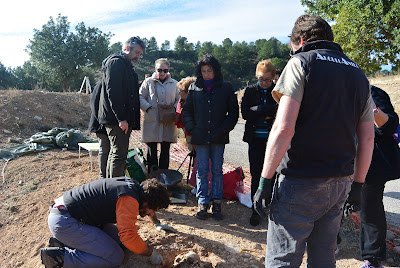ARCHAEOLOGICAL SITE IN MÚSICO PEYDRÓ STREET N. 9 - 11 IN VALENCIA, SPAIN
Con motivo de la construcción del
próximo
Hotel La Luna de Valencia, cuya
promotora es
VALENCIA RENTAL FLATS S.L., estamos realizando una excavación arqueológica para recuperar la
información histórica que pueda albergar esta propiedad y así ahondar en el conocimiento
histórico y arqueológico de la ciudad de
Valencia.
Because of the construction of the La Luna de Valencia Hotel promoted by VALENCIA RENTAL FLATS S.L. we are performing an archaeological
investigation to recover the historical information that this property can
contain and deepen in the historical and archaeological knowledge of the city
of Valencia in Spain.
Hasta ahora los hallazgos se han
centrado en las siguientes fases históricas:
By now the findings have been centered on the
following historical phases:

- FASE DE PRINCIPIOS DEL SIGLO XX
Lo más destacable son las bases
de un conjunto de columnas de fundición que se hallaban en el bajo comercial.
Dichas columnas han sido recuperadas por la propiedad y serán incorporadas a la
decoración del futuro hotel.
- EARLY XX CENTURY PHASE
The most remarkable aspect are the functional columns that can be found on the
commercial basement. Said columns have been taken care by the property and will
be incorporated in the future hotel's decoration.
- FASE DE VIVIENDA DEL SIGLO XIX
De esta casa se conservan varias
estancias y un amplio patio interior con pavimento empedrado de guijarros de río,
muy apropiado para el paso de carruajes y animales.
- XIX CENTURY BUILDING PHASE
Some rooms are preserved and a large back yard
pavement with stones from the river, very appropriated for the carriage and
animals transit.
- FASE DE VIVIENDA DE FINALES DEL
SIGLO XVII
Debajo de los niveles
contemporáneos, se conservan pequeños restos de una casa anterior, reformada a
finales del siglo XVII, en la que una de las habitaciones tenía un pavimento
de baldosas cuadradas de cerámica.
- LATE XVII CENTURY BUILDING PHASE
Under the contemporary level, we can see small
traces of a previous house, remodeled at the end of the XVII century, in which
one of the rooms had a ceramic square-like floor tie pavement.
- FASE DE VIVIENDA MEDIEVAL
Aún más antiguos son los restos
de una casa anterior que se construyó en época islámica y que perduró durante
los siglos XIV y XV. Alguno de los muros de esta etapa conservan hasta unos 60
cm de altura y restos de un enlucido blanco que se hallaba en la habitación más
importante.
- MEDIEVAL BUILDING PHASE
Even more ancient are the rests of the previous
house built in the Islamic phase that lasted for the XIV and XV centuries. Some
of the walls from this phase still have around 60 cm of height and parts of a
white render that was in the most important room.



































